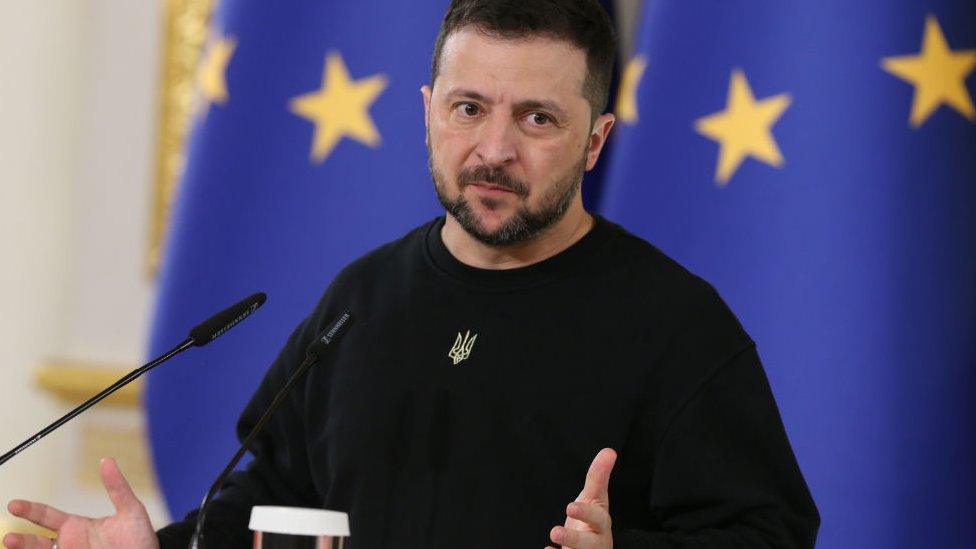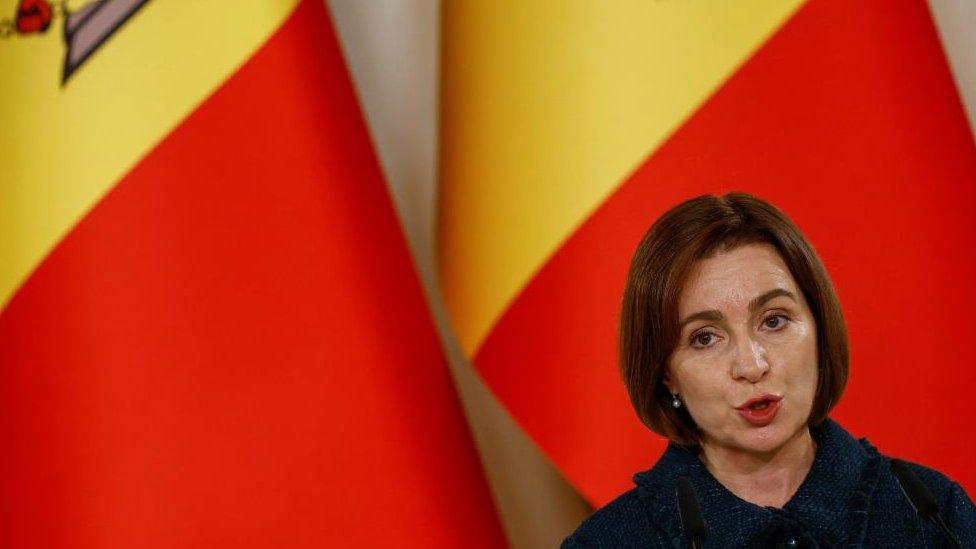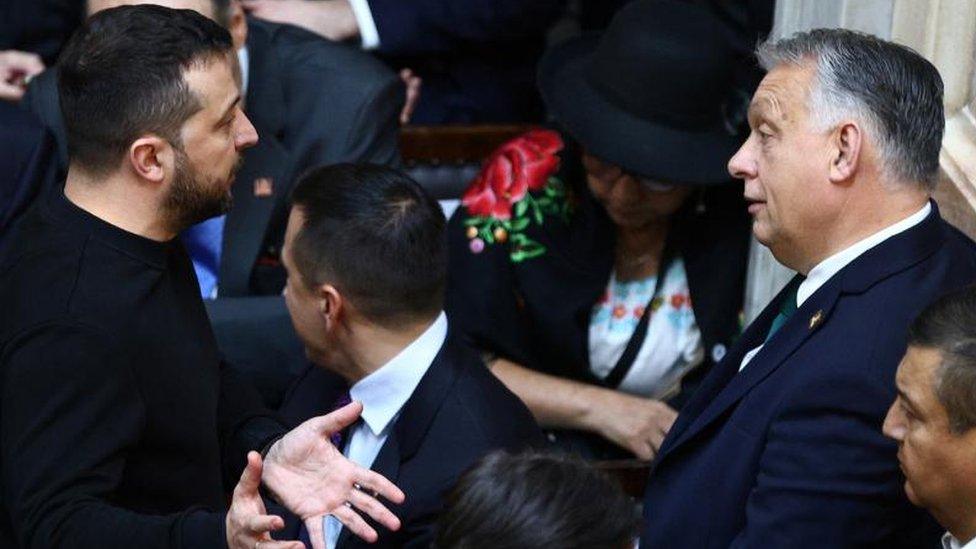EU to open membership talks with Ukraine and Moldova
- Published

Ukraine's President Zelensky called the vote a "victory" for his country and for Europe
European leaders have decided to open EU membership talks with Ukraine and Moldova and to grant candidate status to Georgia.
Ukraine's President Volodymyr Zelensky hailed the decision, made at a summit in Brussels, as "a victory" for his country and Europe.
A spokesperson for Charles Michel, the President of the European Council, said that agreement was unanimous.
Hungary has long opposed talks starting with Kyiv, but did not veto the move.
Prime Minister Viktor Orban left the room momentarily in what officials described as a pre-agreed and constructive manner, while the other 26 leaders went ahead with the vote.
He then distanced himself from his colleagues with a video message on Facebook: "EU membership of Ukraine is a bad decision. Hungary does not want to participate in this bad decision, and therefore stayed away from the decision today."
Mr Zelensky was delighted by the EU's announcement: "This is a victory for Ukraine. A victory for all of Europe. A victory that motivates, inspires and strengthens," he said on X.
Ukraine and Moldova applied to join the EU after Russia launched its full-scale invasion of Ukraine in February 2022. They were both given candidate status last June, while Georgia was passed over at the time.
Moldovan President Maia Sandu said it was an honour to share the path to EU accession with Ukraine. "We wouldn't be here today without Ukraine's brave resistance against Russia's brutal invasion," she wrote.
Earlier this year, Moldova warned that Russia was seeking to seize power in Chisinau. Ms Sandu said Moldovans were now feeling Europe's "warm embrace" and congratulated her compatriots on what she called "an award for all of society, all those who choose democracy and prosperity".

Moldova's President Maia Sandu said the decision to start talks opened a "new page"
White House National Security Adviser Jake Sullivan welcomed the EU's "historic" move to open accession talks with Ukraine and Moldova, calling it a "crucial step toward fulfilling their Euro-Atlantic aspirations".
Talks on joining the European Union can take years, so Thursday's decision will not guarantee Ukraine membership.
People in Ukraine know that the path to full membership is a long one, but this decision in Brussels will be a boost for morale.
EU candidate countries have to pass a series of reforms to adhere to standards ranging from the rule of law to the economy, although the EU's executive has already praised Kyiv for completing more than 90% of the steps taken so far on justice and tackling corruption.
German Chancellor Olaf Scholz praised his fellow leaders for showing a "strong sign of support", adding that it was clear that both Ukraine and Moldova belonged to "the European family". A diplomat at the summit said it was Mr Scholz's idea for Mr Orban to leave the room to enable the vote to go through.
This was some much-needed good news for Ukraine, after almost 22 months of Russia's war and a continuing struggle to secure Western military and financial aid.
Finnish Prime Minister Petteri Orpo said it was a historic moment and an "important message of hope" for the citizens of Ukraine and Moldova.
Mr Zelensky travelled to the US earlier this week in a vain attempt to persuade the US Congress to push through $61bn in military funding, blocked by Republican lawmakers.
Ukraine's counter-offensive against Russia's occupying force has ground to a halt at the start of winter.
Earlier on Thursday, President Vladimir Putin mocked Ukraine and claimed Western support was running out: "Excuse my vulgarity, but everything is being brought in as a freebie. But those freebies could run out at some point."
But President Zelensky will at least now be able to point to this political win as proof that Ukraine is not steadily being abandoned by its partners.
The European Council president said it was a "very powerful signal... to the people of Ukraine we are on their side".
Many in Kyiv see their fight against Russia's invasion as a defence of European values and they firmly view their future as an active and effective member of the European Union.
Ukraine's 2014 "Revolution of Dignity", toppling its pro-Kremlin president, was rooted in a desire to move away from Russia's political orbit and towards Europe.
President Putin reacted by sending troops into eastern Ukraine and Crimea and then staging a far wider invasion in 2022.
For Georgia too, invaded by Russia in 2008, the EU vote was a "monumental milestone", said pro-EU President Salome Zurabishvili.
Georgia has a broadly pro-EU population, its government has a complex relationship with Moscow and has refrained from imposing sanctions on Russia since its invasion of Ukraine began.
Asked if President Putin had ambitions to do to Georgia what he was doing to Ukraine, pro-Putin Russian lawmaker and TV host Yevgeny Popov told BBC Newsnight, "We are not going to."
"We have enough territory," he said. "We are the biggest country in the world and we don't need any other territories. But all we need is security guarantees."
On Thursday, Mr Michel said the EU also intended to open negotiations with Bosnia-Herzegovina once it met criteria for membership. Bosnia was given candidate status a year ago but a progress report last month has listed further steps Sarajevo needs to take on electoral and judicial reforms.
Bosnia has the added issue of the leader of its majority-Serb area, Republika Srpska, threatening to secede.
- Published14 December 2023
